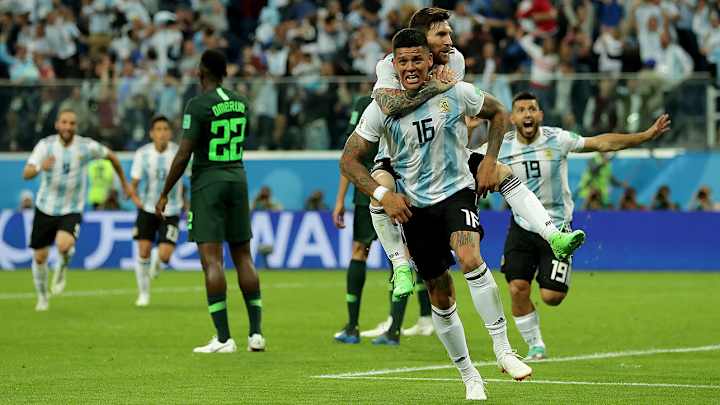From Elimination to Elation: Argentina Somehow Staves Off Early World Cup Exit

It’s probably best not even to try to make sense of it. You have Lionel Messi in your side. You bring on Sergio Aguero to play alongside Gonzalo Higuain in front of him. You have taken off Angel Di Maria. You have just brought on Cristian Pavon. None of them look like scoring. Passes are misplaced. The shape has gone. Every attempt to advance, it seems, runs into a Nigerian wall. It’s the same story as against Iceland, as against Croatia. All of the ball, no penetration. And then the goal comes. You make all your plans, you squeeze in as many gifted forwards as you can, and somehow the vital 86th-minute winner is scored by Marcos Rojo turning up with no justification whatsoever to volley in a rare accurate cross from Gabriel Mercado. With his wrong foot.
So Argentina goes through to the knockout stage after a 2-1 win over Nigeria and a second-place finish in the group, meaning it will face France in the last 16 on Saturday. Whether it means anything beyond that is another issue. This was a much-improved performance from Jorge Sampaoli’s side, at least in the first half, but the faults that have haunted it over the past year have not disappeared. Again and again, Messi, who himself scored a goal of stunning quality, picked up the ball just inside the Nigeria half, turned and found himself surrounded by four opponents. Nigeria, for the most part, defended well and will curse the chances it missed in the second half.
Argentina Gets a Clean World Cup Slate After Marcos Rojo's Heroic Volley
Argentina made five changes to the side that had lost so humiliatingly to Croatia. That smacked of panic, of Sampaoli–or whoever was picking the side, for Messi and Javier Mascherano have, at the very least, consulted with their coach–shaking his kaleidoscope and seeing where the pieces fell. But actually, this was the plan Sampaoli had outlined before the tournament. The panic had come before the Croatia game with the misguided switch to a back three that Messi had always opposed.
Sampaoli had described it as a 2-3-3-2, others may see it as a 4-4-2 diamond (albeit with Di Maria more advanced on the left than Enzo Perez was on the right), but whatever you call it, it worked. The presence of Ever Banega, at last, in midfield meant Argentina had a creative presence who wasn’t Messi, and that, at least to an extent, reduced the dependence on him. Sure enough, it was Banega who laid on the opener with a delicious pass over the top.
Messi’s first touch on his thigh was extraordinary; his second, nudging the ball forward before it had touched the ground, even better; his third, the finish, felt inevitable. It was a goal that was the encapsulation of Messi’s minimalist brilliance: every touch was difficult, but every touch was necessary. This wasn’t flamboyance for the sake of it. He was just finding the most efficient route to goal. In the stands, Diego Maradona hugged himself and howled at the sky; presented with such genius, it seemed an entirely proportionate response.
Messi hit the post with a free kick and almost laid in Higuain for a second that would have steadied nerves, but however improved Argentina when it was going forward, it remains rather shambolic at the back. Mascherano had given the ball away repeatedly in the first half, and a vital presence for Argentina over the years who increasingly looks superannuated.
For much of the second half here, he played on with blood streaming from a facial wound, ever the warrior. But four minutes into the second half, he wrestled with Leon Balogun during a corner kick. Argentina, perhaps, will argue that Balogun should not have been on the pitch after tripping Di Maria when he was through on goal in the first half, but Mascherano’s offense, while far from the worst grappling seen at this World Cup, was clear enough. Victor Moses calmly rolled in the penalty to provisionally put Nigeria in second place, and Argentina out altogether.
Spain, Portugal Emerge From World Cup Group After Influential Use of VAR
And then came the agony. A stressed Argentina loses its shape and its composure. Too much is attempted too rapidly. Players try to do too much. And at the heart of the discord, somehow, is Messi, the greatest victim of the Argentinian problem, and yet in part the cause of it. Were he not so great, were there not such an urge to win him the World Cup, the pressure might perhaps be less. Were he not so great, Argentina might play through him less and be less predictable.
The familiar script seemed written, Argentina flailing wildly at unyielding opponents and getting nowhere, as it had against Germany in the World Cup final, as it had against Chile in the two Copa America finals. There was even the requisite chance spurned from Higuain, blasting over from 10 yards as he met Maximiliano Meza’s low cross from the left.
But then came Rojo’s astonishing intervention. In the stand, Maradona flipped a pair of middle fingers at the seats below him. Again, it seemed a reasonable response: this was Argentina defying its critics, defying the world, defying all logic, defying itself.

An accomplished author of multiple books, Jonathan Wilson is one of the world’s preeminent minds on soccer tactics and history.